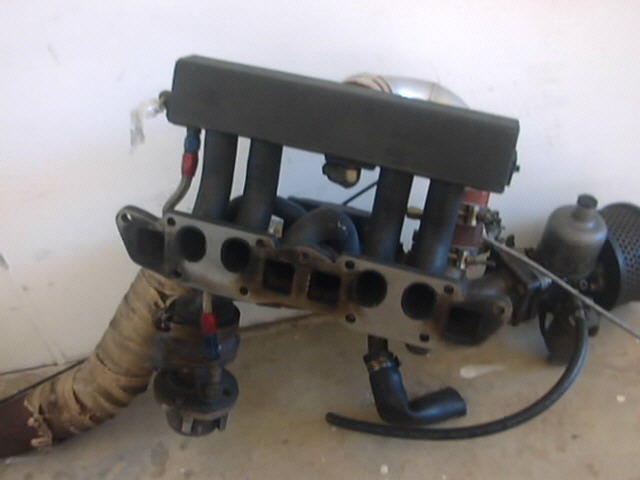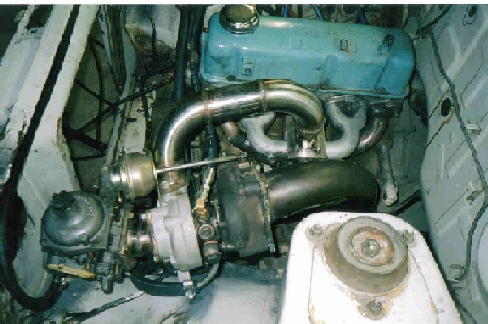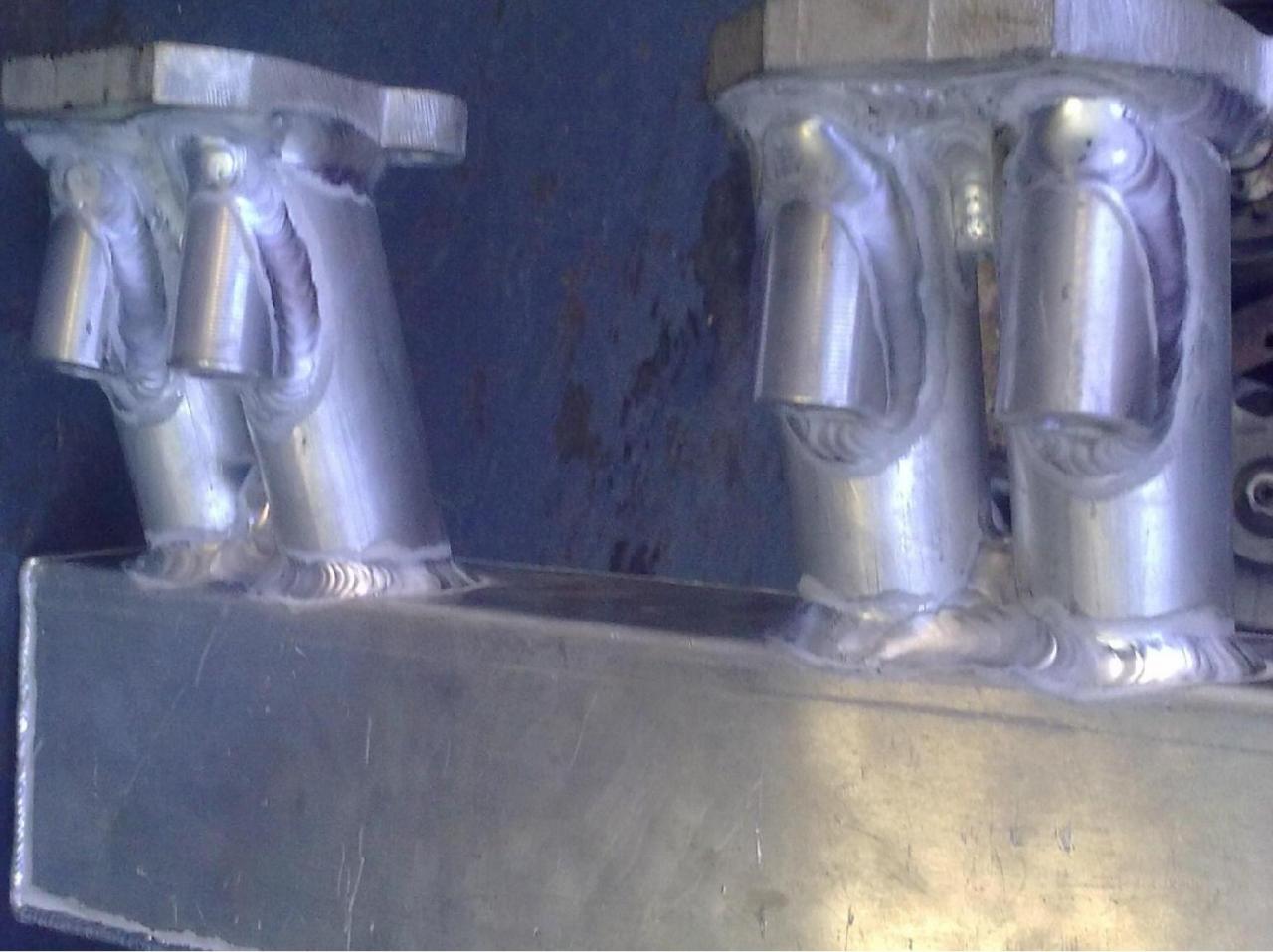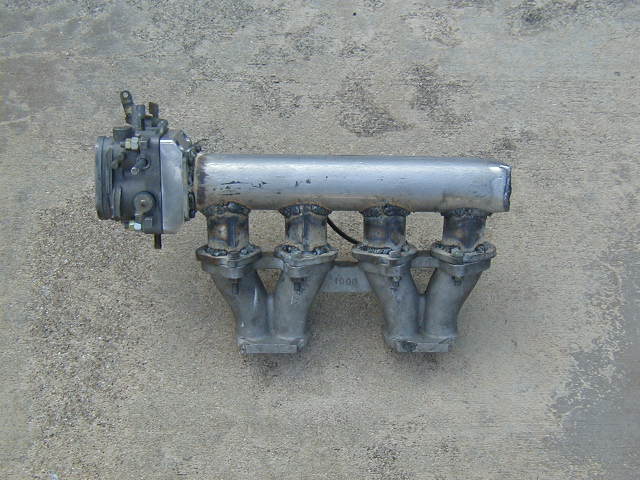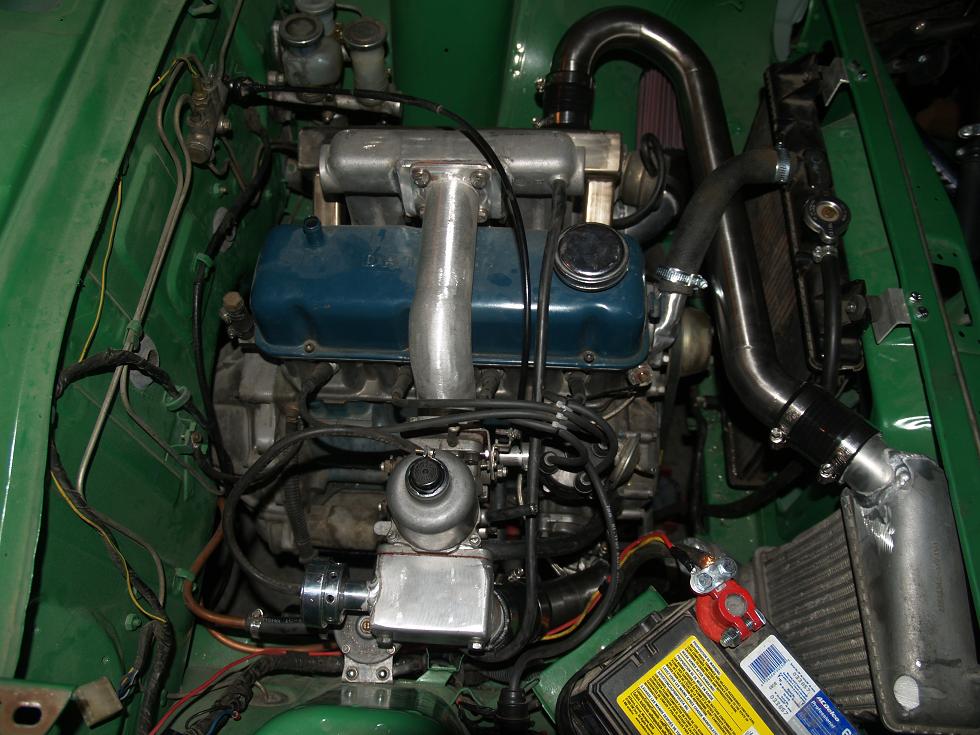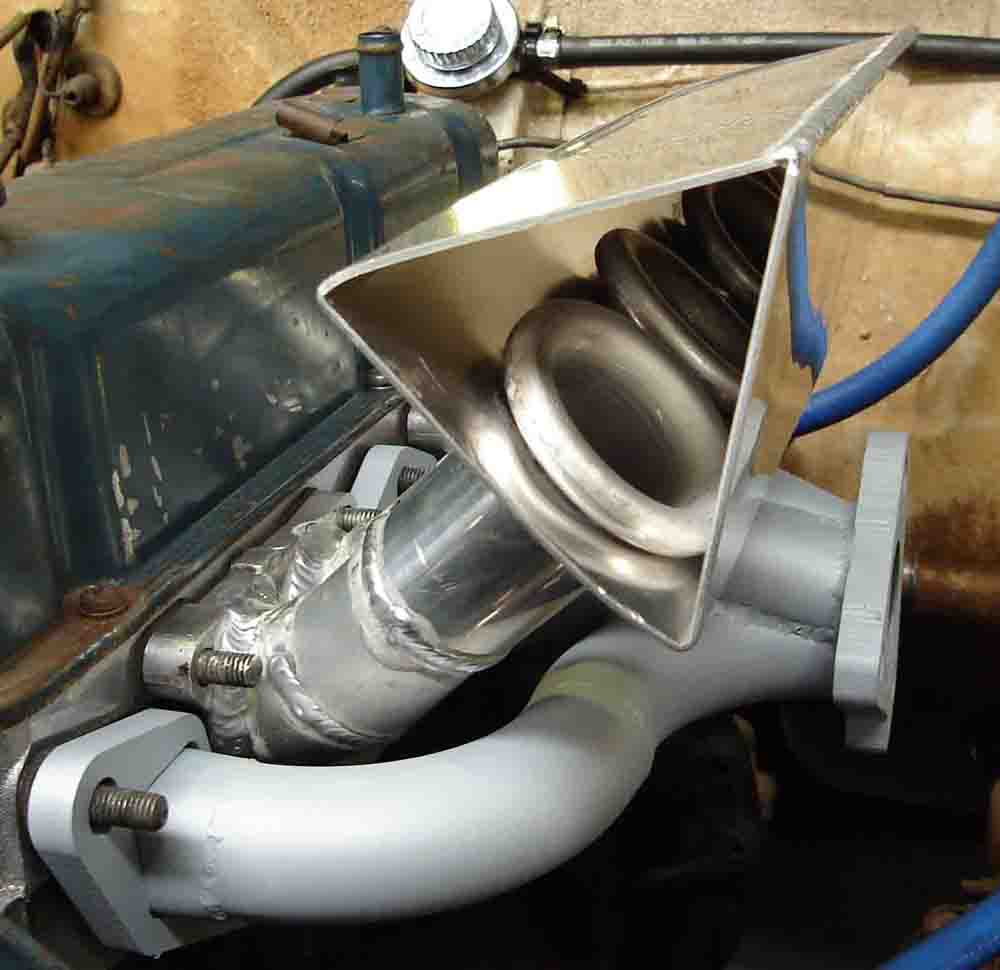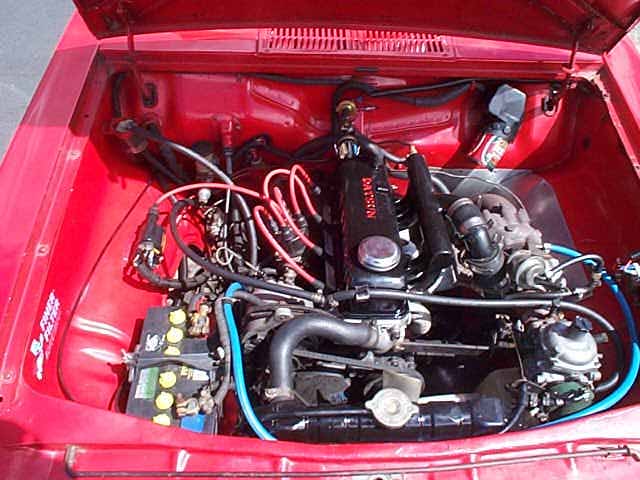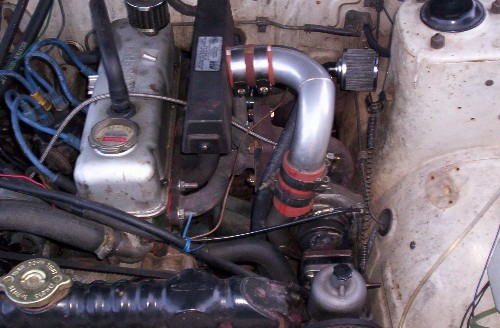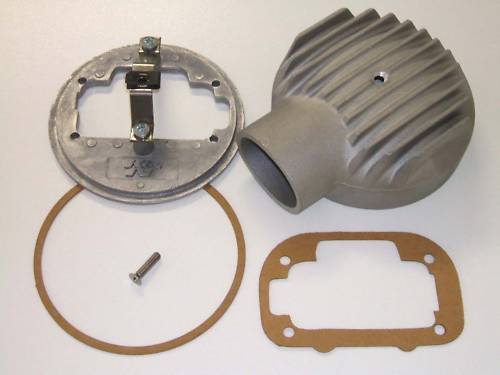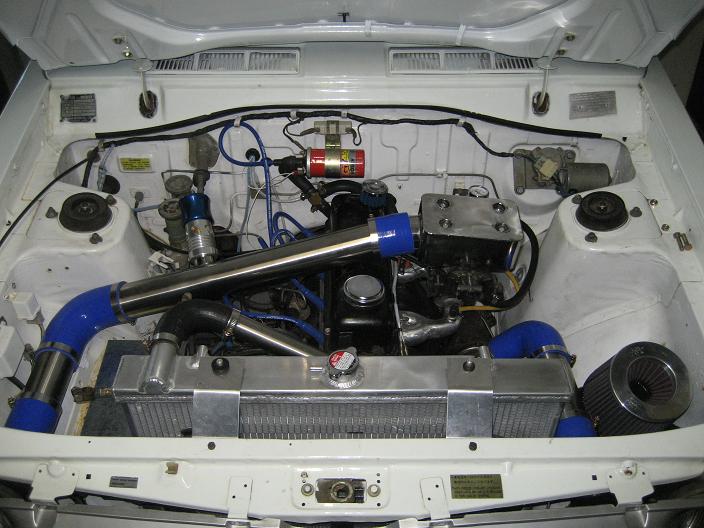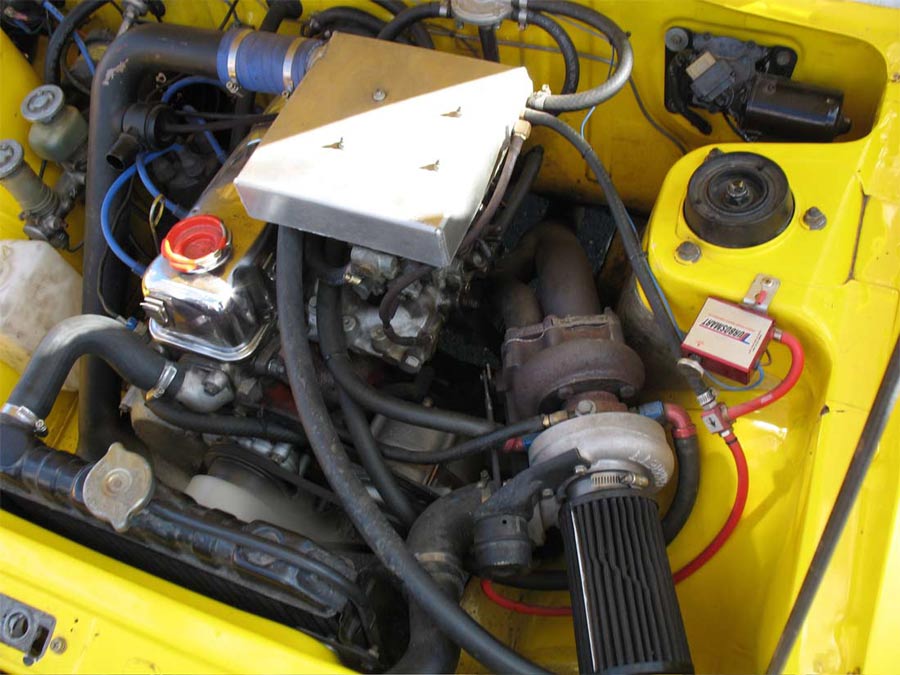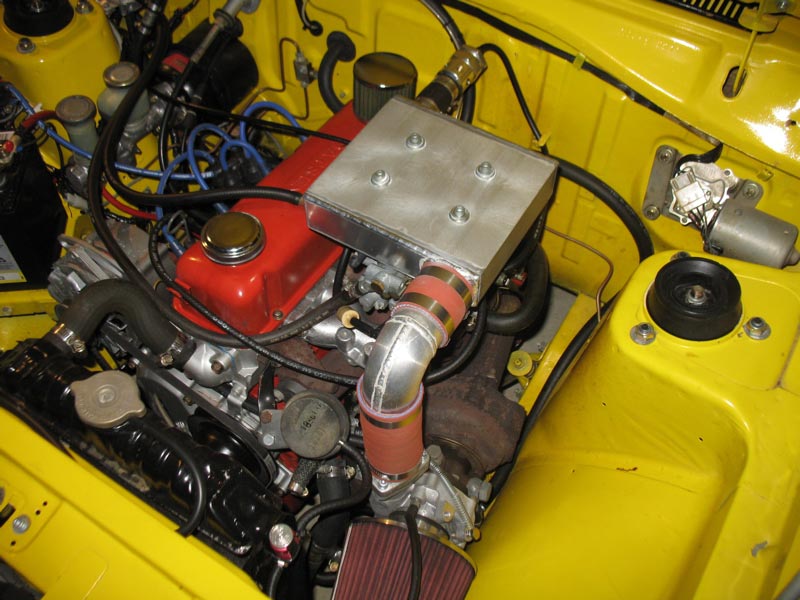| Revision as of 11:52, 18 August 2016 ddgonzal (Talk | contribs) (->Stock Manifold) <- Previous diff |
Current revision ddgonzal (Talk | contribs) (->Log Manifolds) |
||
| Line 1: | Line 1: | ||
| - | Intake manifolds for a [[Turbo]] engine. For more airflow, a higher flowing carb, intake, heads (ports and valves) and exhaust system is beneficial. Supercharging will increase power on a stock engine, but increasing the airflow capability of the engine will bring your blown engine to its full potential | + | Intake manifolds for a [[Turbo]] engine. For more airflow, a higher flowing carb, intake, heads (ports and valves) and exhaust system is beneficial. Supercharging will increase power on a stock engine, but increasing the airflow capability of the engine will bring your blown engine to its full potential. |
| - | A15 Turbo using factory Twin Hitachi manifold | + | = Overview = |
| - | <br>{{AlbumPhoto|17526}} | + | [[#Top-hatted Carburetor]] on stock manifold |
| + | <br>{{Album|10474|jpg|400}} | ||
| - | Stock manifold with carburetor hat -- see [[#Stock Manifold|#Boxed Carburetor]] | + | [[#Boxed Carburetor]] |
| - | <br>{{Album|21572}} | + | <br>{{Album|2253}} |
| - | Tuned-port Intake | + | [[#Log Manifolds]] |
| + | <br>{{Album|4862}} | ||
| + | |||
| + | [[#Tuned_Runner_Length|#Tuned-port Intake]] | ||
| <br>{{Album|661}} | <br>{{Album|661}} | ||
| - | Log manifold | + | As far as designing a custom inlet manifold for a turbo, keep the path from carby to turbo as short and straight as possible (hopefully with no uphill stretches) from the turbo, out and up to the top of the manifold. It'll be impossible to avoid an uphill stretch there, just avoid unnecessary twists turns and uphill (or otherwise long) stretches. Use a log type inlet, with the log reaching further forward and back than the front and rear runners. |
| - | <br>{{Album|4862}} | + | |
| + | ??? | ||
| + | <br>{{AlbumPhoto|1982}} {{Album|1981}} | ||
| + | |||
| + | {{Album|6060}} | ||
| + | |||
| + | = Stock Manifold = | ||
| + | [[Turbo#Draw-through_or_blow-through_turbo_systems.3F|Blow-through]] or [[Turbo#Draw-through_or_blow-through_turbo_systems.3F|draw-through]] systems can use the stock [[Intake Manifold]]. | ||
| + | |||
| + | Draw-through | ||
| + | <br>{{AlbumLink|Turbo|10476|MED|aname=#oan78}} | ||
| + | |||
| + | Stock manifold with EFI throttle body (see [[$1200 EFI Turbo A12]]) | ||
| + | <br>{{UploadPost|6746_551625dbea3e4.jpg|465360}} | ||
| + | |||
| + | Blow-through with [[#Top-hatted Carburetor]] | ||
| + | <br>{{Album|526}} {{AlbumLink|Turbo|10474|MED|aname=#oan78}} | ||
| + | |||
| + | Blow-through with [[#Boxed Carburetor]] | ||
| + | <br>{{Album|255}} | ||
| + | |||
| + | With pressure hose adapter | ||
| + | <br>{{Album|1000}} {{Album|1004}} | ||
| + | |||
| + | Stock Manifold cut and swapped sides | ||
| + | <br>{{Album|5889}} | ||
| + | |||
| + | A15 Turbo using factory Twin Hitachi sidedraft manifold. Adapter runners bolt to a single Weber DCOE | ||
| + | <br>{{AlbumPhoto|17526}} | ||
| + | |||
| + | = Log Manifolds = | ||
| + | A log manifold is a cylindrical plenum type with individual runners to each cylinder. Log manifolds can either be fed by an EFI throttle body or by a sidedraft carburetor. They can be used with either blow-through or draw-through systems. | ||
| + | |||
| + | {{See|EFI Manifold#Overview| for more Log info}} | ||
| + | |||
| + | Generally, any EFI log manifold can be used with a turbo, you can even use them with a carburetor feeding the log. | ||
| Log Manifold | Log Manifold | ||
| - | <br>{{ThumbH|20267}} {{ThumbH|20268}} {{ThumbH|20269}} | + | <br>{{AlbumH|20267}} {{AlbumH|20268}} {{AlbumH|20269}} |
| UM-1 Manifold | UM-1 Manifold | ||
| Line 27: | Line 66: | ||
| This kind of stock manifold-runner is limited in horsepower. The turbo can force more air through it (for more HP) but the air temp will escalate, limiting the power to be made. | This kind of stock manifold-runner is limited in horsepower. The turbo can force more air through it (for more HP) but the air temp will escalate, limiting the power to be made. | ||
| <br>{{Album|21086}} | <br>{{Album|21086}} | ||
| + | |||
| + | Corolla manifold adapted | ||
| + | <br>{{AlbumLink|Turbo|21918|MED|aname=#slam1024}} | ||
| + | |||
| + | Draw-through with very small plenum | ||
| + | <br>{{AlbumLink|Turbo|9809|MED|aname=#rice}} | ||
| + | |||
| + | {{Album|6974}} | ||
| + | |||
| + | With air horns (trumpets) | ||
| + | <br>{{AlbumH|8135}} {{AlbumH|8136}} {{AlbumH|8137}} | ||
| + | |||
| + | {{AlbumLink|Turbo|19909|MED|aname=#datsonovic}} | ||
| + | |||
| + | Far-side-mounted intercooler | ||
| + | <br>{{Album|2443}} | ||
| + | |||
| + | A15 in Datsun 1000 | ||
| + | <br>{{Album|2511}} {{Album|2519}} | ||
| + | |||
| + | EFI A14 by [[Turbo#dato8u|dato8u]] | ||
| + | <br>{{AlbumH|4481|jpg|267}} {{Album|4480|jpg|400}} | ||
| = Tuned Runner Length = | = Tuned Runner Length = | ||
| Line 32: | Line 93: | ||
| <br>{{Album|23939}} | <br>{{Album|23939}} | ||
| - | Optimum runner length vs RPM 408161 | + | Optimum runner length vs RPM |
| - | <br><img size=400>http://i277.photobucket.com/albums/kk47/budleach/intakerunnerlength.jpg</img> | + | <br>{{PhotoPost|intakerunnerlength.jpg|408161}} |
| - | = Stock Manifold = | + | {{Album|7611}} |
| - | [[Turbo#Draw-through_or_blow-through_turbo_systems.3F|Blow-through]] systems can use the stock [[Intake Manifold]]. | + | |
| - | + | ||
| - | Stock manifold with carburetor hat | + | |
| - | <br>{{Album|526}} | + | |
| - | Stock manifold with EFI throttle body | + | = Top-hatted Carburetor = |
| - | <br>{{UploadPost|6746_551625dbea3e4.jpg|465360}} | + | Feeding the carburetor via a top hat was a popular OEM method. phunkdotaspok say the stock Hitachi can handle 10 psi with a good top-gasket seal. In an NA application, a warped top is not a problem, as there is no pressure in the float chamber. This only becomes important in boosted application. |
| - | = Top-hatted Carburetor = | ||
| Blow-through system feeding carb top-hat | Blow-through system feeding carb top-hat | ||
| <br>{{AlbumPhoto|519}} | <br>{{AlbumPhoto|519}} | ||
| Line 51: | Line 107: | ||
| <br>{{Album|21572}} {{Album|21573}} | <br>{{Album|21572}} {{Album|21573}} | ||
| - | This was a popular OEM method. phunkdotaspok say the stock Hitachi can handle 10 psi with a good top-gasket seal. In an NA application, a warped top is not a problem, as there is no pressure in the float chamber. This only becomes important in boosted application. | + | Twin-sidedraft top hat |
| + | <br>{{Album|1127}} {{Album|2967}} | ||
| - | downdraft Dellorto carburetor | + | downdraft Dellorto carburetor on custom manifold |
| <br>{{Album|21056}} | <br>{{Album|21056}} | ||
| [[Weber 32/36 Carburetor]] hat | [[Weber 32/36 Carburetor]] hat | ||
| <br>{{Album|22271}} | <br>{{Album|22271}} | ||
| + | |||
| + | Good for 10psi | ||
| + | <br>{{Album|13860}} | ||
| + | |||
| + | {{Album|3496}} | ||
| + | |||
| + | Twin Sidedraughts | ||
| + | <br>{{AlbumLink|Turbo|5526|MED|aname=#kegs}} | ||
| + | |||
| + | [http://datsun1200.com/modules/mediawiki/index.php?title=Turbo#fat910 http://datsun1200.com/uploads/newbb/thumbs/9641_49d47d0def86c.jpg] | ||
| + | |||
| + | Blow-through | ||
| + | <br>{{AlbumLink|Turbo|10474|MED|aname=#oan78}} | ||
| + | |||
| + | {{Album|8415}} {{Album|8579}} | ||
| = Boxed Carburetor = | = Boxed Carburetor = | ||
| - | Boxing carb. This allows a more or less stock carb to be used, the outsided pressure balancing the inside pressure | + | Blow through works well. The main reason to use this over a draw-through is so an [[Turbo#Intercooler|intercooler]] can be used. The boxed carburetor can take more boost than the top-hatted carburetor. |
| + | |||
| + | Boxing the carb allows a more or less stock carb to be used, the outside pressure balancing the inside pressure. Special non-crushable fuel floats are needed. | ||
| + | |||
| + | {{Album|2249}} {{Album|2253}} | ||
| - | Inside the box | + | {{Album|535}} |
| - | <br>{{Album|535}} | + | |
| - | = datto1000wagon = | + | {{Album|255}} {{Album|293}} |
| - | {{Album|18884}} {{Album|18885}} | + | |
| - | {{ThumbH|16585}} {{ThumbH|16584}} {{ThumbH|16583}} {{ThumbH|16582}} {{ThumbH|16563}} {{ThumbH|16562}} {{ThumbH|16561}} {{ThumbH|16560}} | + | {{Album|350}} |
| [[Category:Forced Induction]]{{End}} | [[Category:Forced Induction]]{{End}} | ||
Current revision
Intake manifolds for a Turbo engine. For more airflow, a higher flowing carb, intake, heads (ports and valves) and exhaust system is beneficial. Supercharging will increase power on a stock engine, but increasing the airflow capability of the engine will bring your blown engine to its full potential.
Contents |
Overview
#Top-hatted Carburetor on stock manifold
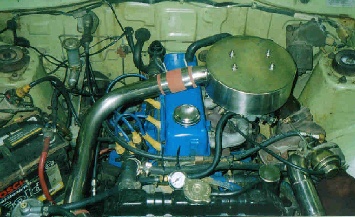
As far as designing a custom inlet manifold for a turbo, keep the path from carby to turbo as short and straight as possible (hopefully with no uphill stretches) from the turbo, out and up to the top of the manifold. It'll be impossible to avoid an uphill stretch there, just avoid unnecessary twists turns and uphill (or otherwise long) stretches. Use a log type inlet, with the log reaching further forward and back than the front and rear runners.
Stock Manifold
Blow-through or draw-through systems can use the stock Intake Manifold.
Stock manifold with EFI throttle body (see $1200 EFI Turbo A12)
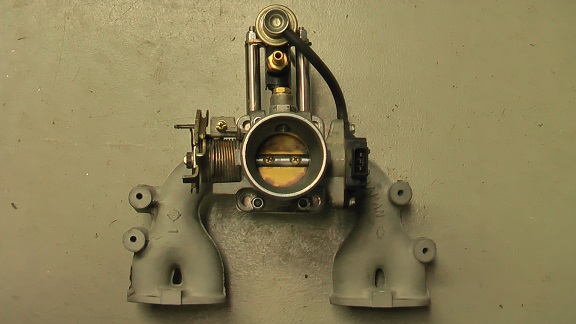
Blow-through with #Top-hatted Carburetor


Blow-through with #Boxed Carburetor

Stock Manifold cut and swapped sides
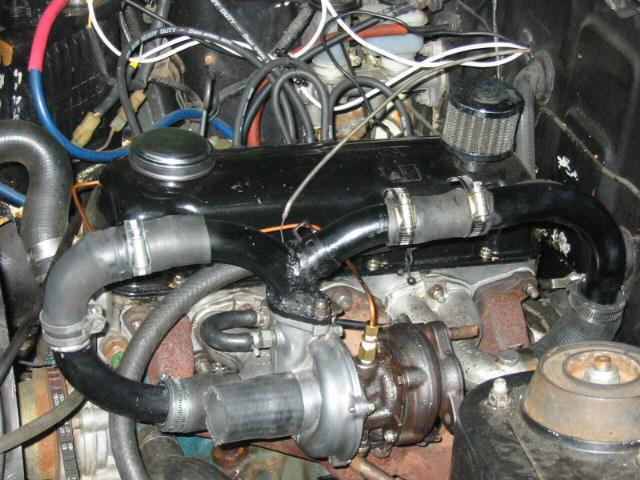
A15 Turbo using factory Twin Hitachi sidedraft manifold. Adapter runners bolt to a single Weber DCOE

Log Manifolds
A log manifold is a cylindrical plenum type with individual runners to each cylinder. Log manifolds can either be fed by an EFI throttle body or by a sidedraft carburetor. They can be used with either blow-through or draw-through systems.
Generally, any EFI log manifold can be used with a turbo, you can even use them with a carburetor feeding the log.
clyon's A-series Turbo Manifolds

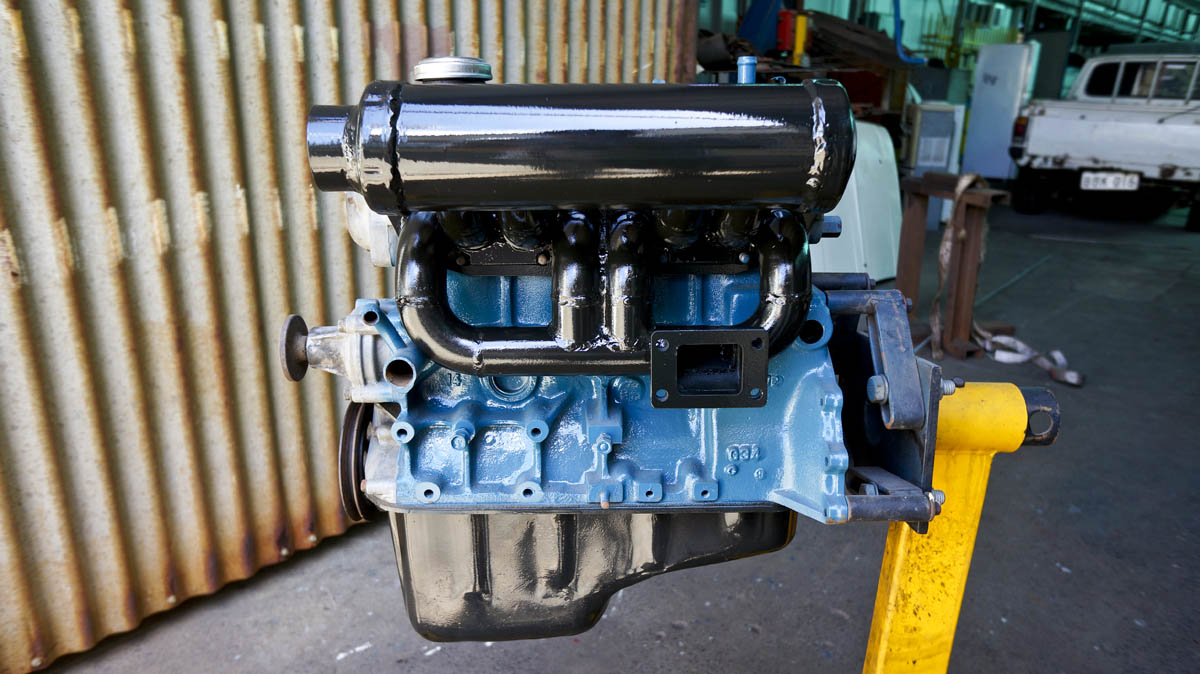
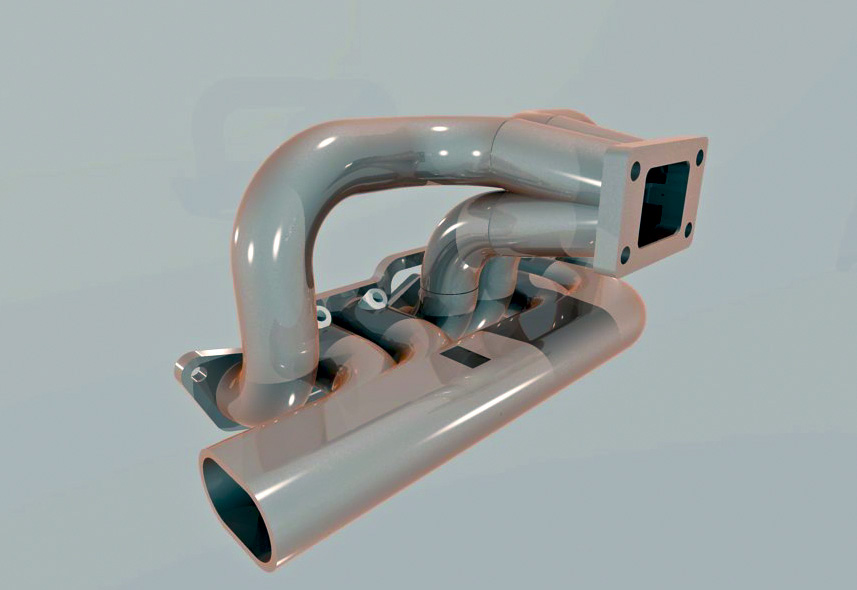
This kind of stock manifold-runner is limited in horsepower. The turbo can force more air through it (for more HP) but the air temp will escalate, limiting the power to be made.
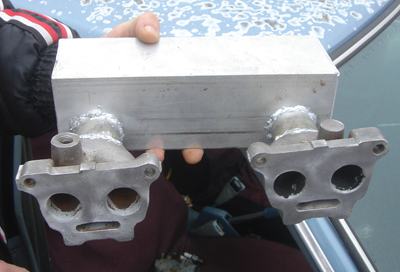
Draw-through with very small plenum
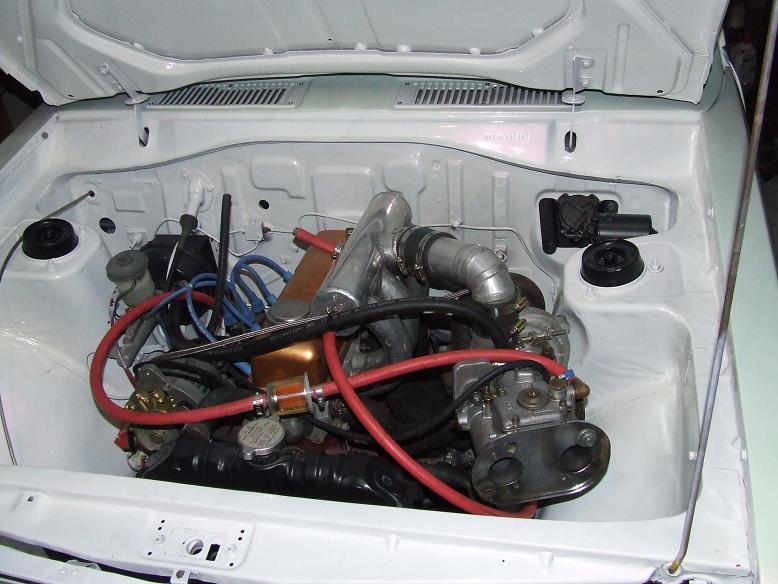
EFI A14 by dato8u
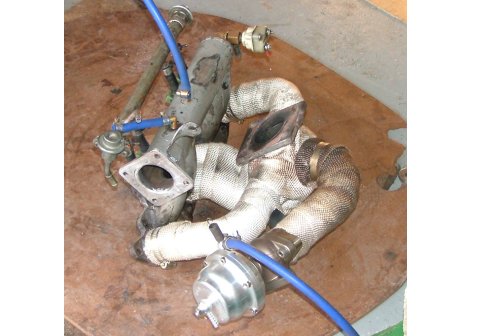

Tuned Runner Length
For scavenge effect at 5000 RPM, the runners should be 20" long!
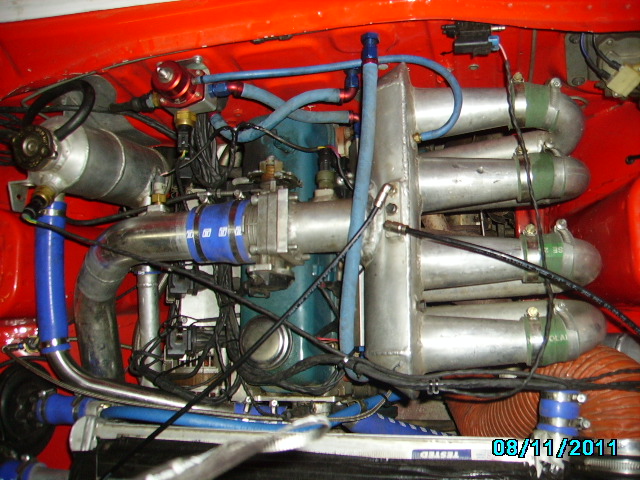
Top-hatted Carburetor
Feeding the carburetor via a top hat was a popular OEM method. phunkdotaspok say the stock Hitachi can handle 10 psi with a good top-gasket seal. In an NA application, a warped top is not a problem, as there is no pressure in the float chamber. This only becomes important in boosted application.
Blow-through system feeding carb top-hat

Weber 32/36 Carburetor with custom top hat
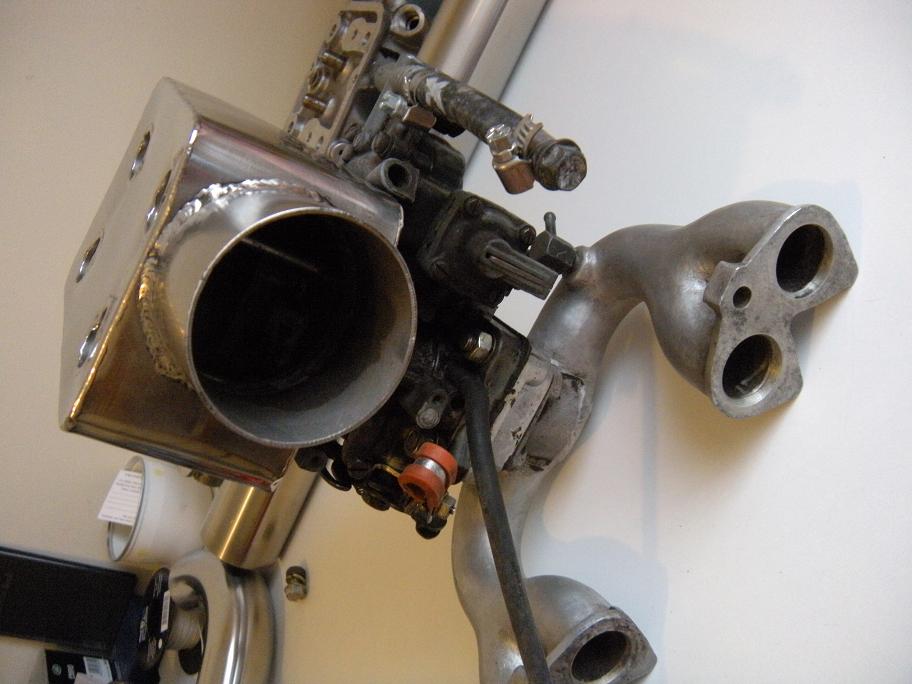
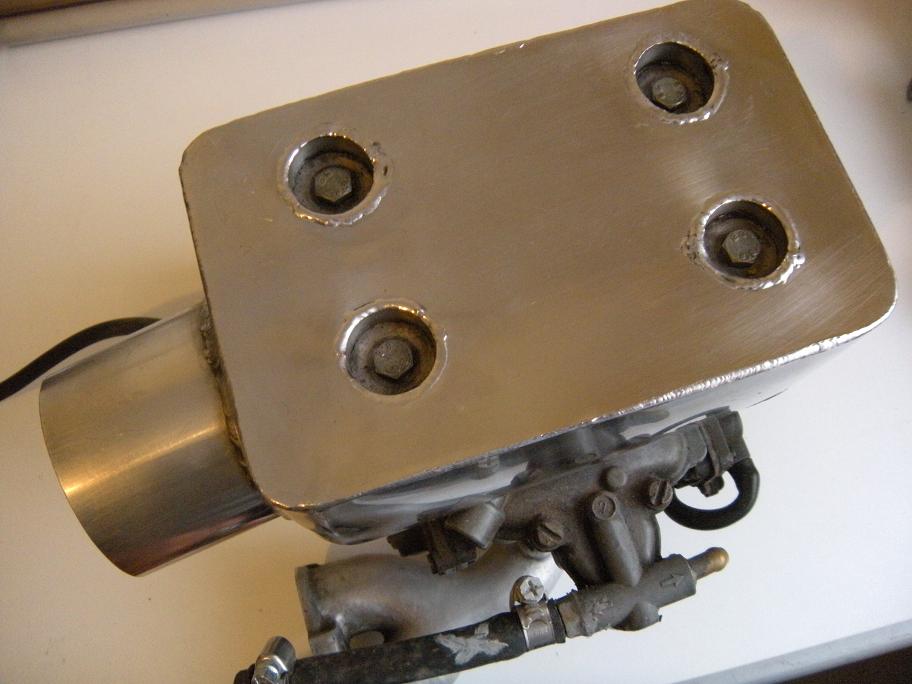
downdraft Dellorto carburetor on custom manifold
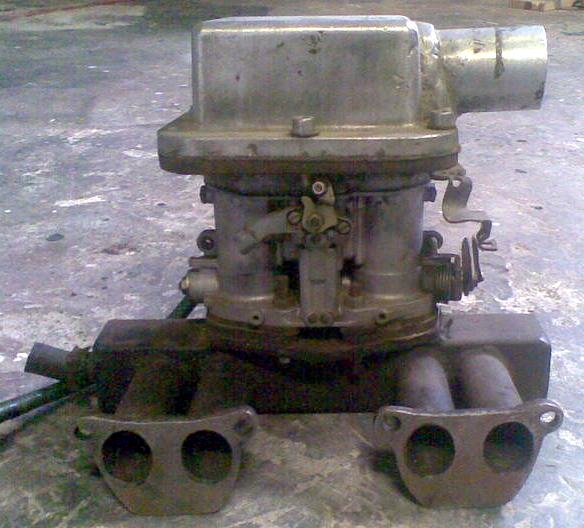
Boxed Carburetor
Blow through works well. The main reason to use this over a draw-through is so an intercooler can be used. The boxed carburetor can take more boost than the top-hatted carburetor.
Boxing the carb allows a more or less stock carb to be used, the outside pressure balancing the inside pressure. Special non-crushable fuel floats are needed.

![[Datsun 1200 encyclopedia]](/wiki/upload/wiki.png)





